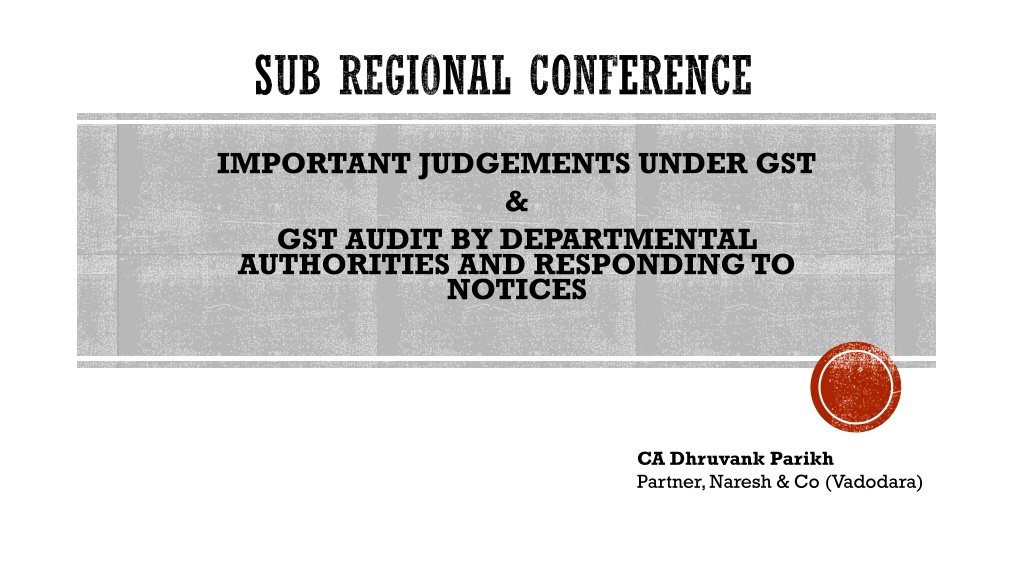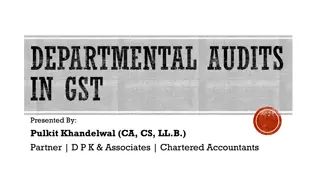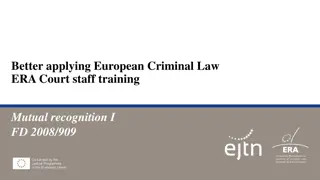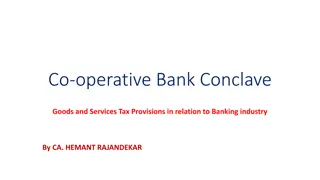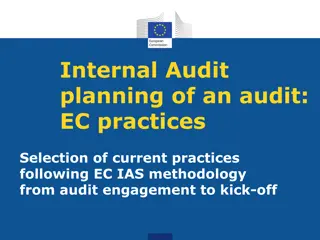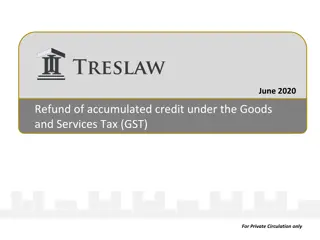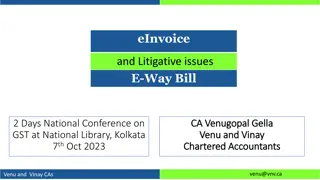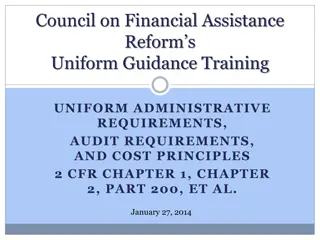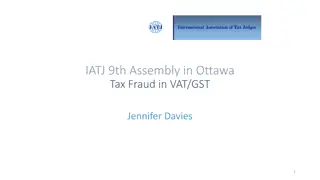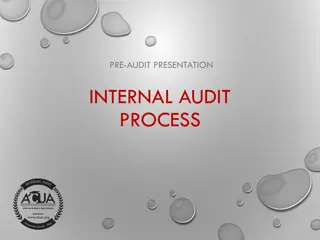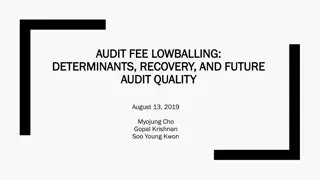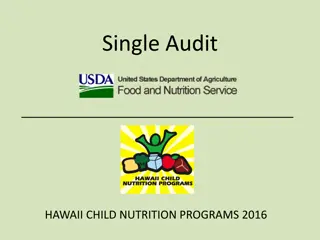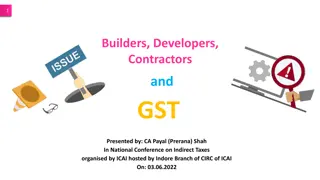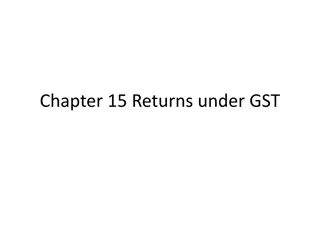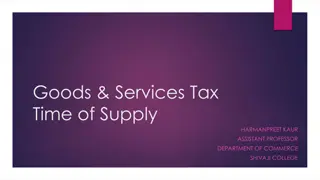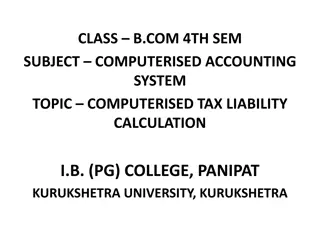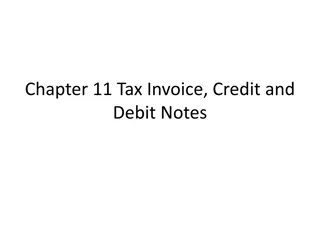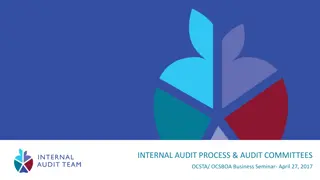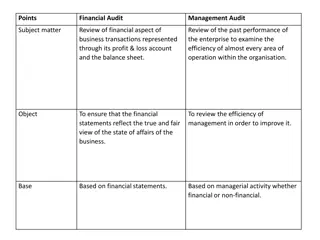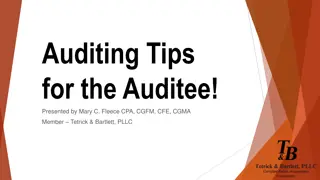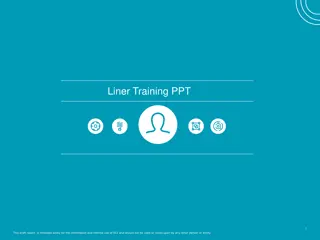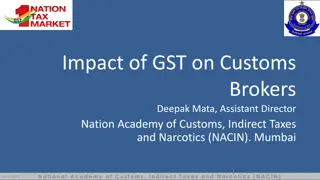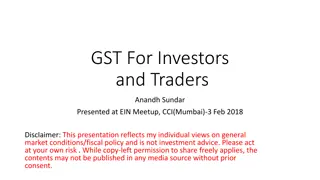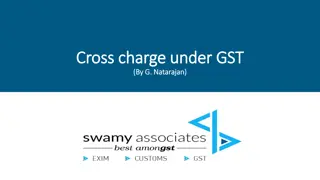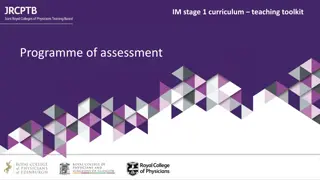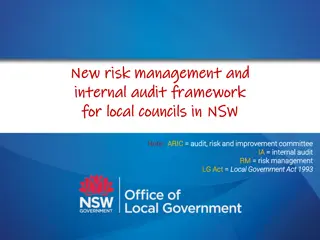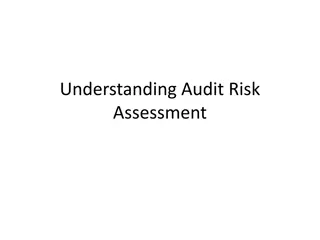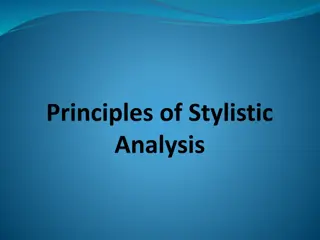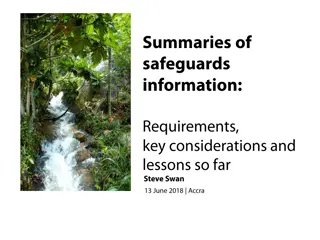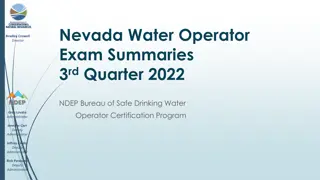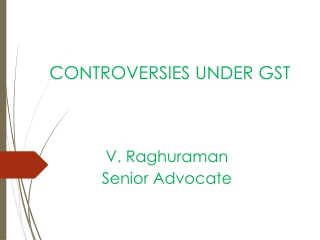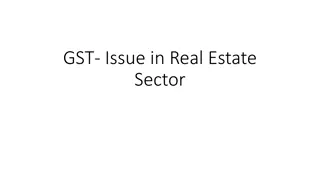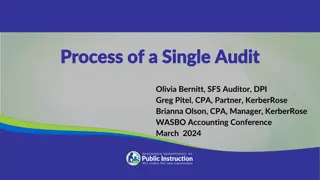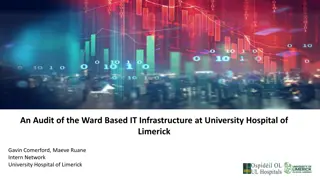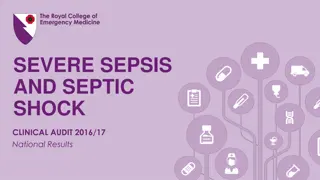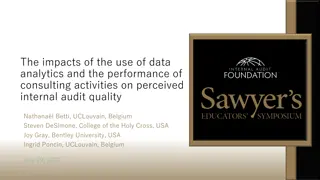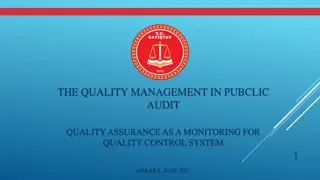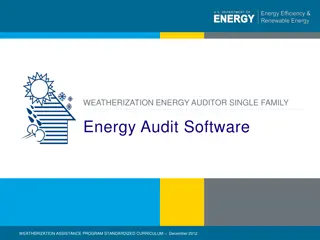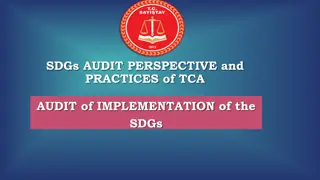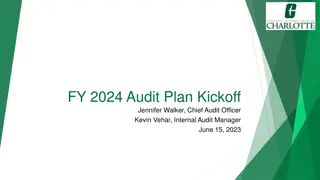Important Judgements under GST & GST Audit: Case Summaries
M/S. Sri Gopikrishna Infrastructure Pvt. Ltd. faced penalties for not upgrading or amending e-way bills promptly, while Millennium Leisure Hospitality Services Pvt. Ltd. challenged tax and penalty levies due to e-way bill issues. Legal proceedings and decisions are outlined.
Download Presentation

Please find below an Image/Link to download the presentation.
The content on the website is provided AS IS for your information and personal use only. It may not be sold, licensed, or shared on other websites without obtaining consent from the author. Download presentation by click this link. If you encounter any issues during the download, it is possible that the publisher has removed the file from their server.
E N D
Presentation Transcript
SUB REGIONAL CONFERENCE IMPORTANT JUDGEMENTS UNDER GST & GST AUDIT BY DEPARTMENTAL AUTHORITIES AND RESPONDING TO NOTICES CA Dhruvank Parikh Partner, Naresh & Co (Vadodara)
M/S. SRI GOPIKRISHNA INFRASTRUCTURE PVT. LTD. VS. STATE OF TRIPURA AND ORS (TRIPURA HC) It has submitted that true it is that the breach is covered under Section 122(xiv) of the CGST Act. But the petitioner has committed gross negligence by not upgrading or amending the e-way bill when the regular e-way bill had expired in transit. The e-way bill was upgraded or amended when the consignment was detained. As such, there is no irregularity or lack of proportionality in imposing the penalty. The Govt. has pointed out that the penalty has been imposed only for not tendering the valid e- way bill for the movement of the vehicle with goods. Tax and the penalty have been imposed as per the law. Having appreciated the rival contentions, we are satisfied that the breach definitely falls within the ambit of Section 122(xiv) of the CGST Act and as such the petitioner is excisable to the penalty. But the pertinent question that falls for consideration is whether the Superintendent of State Tax has exceeded his jurisdiction in imposing the penalty? Having read the provisions of imposing penalty as provided under Section 122 of the CGST Act, we are of the view for the breach which falls under Section 122(xiv), the penalty is fixed @Rs.10,000/-. So far the penalty for an amount equivalent to tax is concerned those are for the incidents when the tax is sought to be evaded or not deducted under Section 51 etc. The other incidences as cataloged in Section 122 of the CGST Act are not relevant to the present case and as such we are of the firm view that the Superintendent of State Tax has exceeded his jurisdiction while imposing the penalty. The penalty would have been Rs.10,000/-. As there is no dispute about the tax, we will not lay our hands on that aspect as it has been categorically stated that the petitioner has paid the said tax. But in the circumstances, we set aside the order of penalty and direct the petitioner to pay the sum of Rs. 10,000/- as penalty for the breach which is covered under Section 122(xiv) of the CGST Act within a period of 1 month from today. If not paid, the action as prescribed by the statue be followed for realizing the same. 2 Rajkot Branch of WIRC of ICAI CA Dhruvank Parikh
MILLENNIUM LEISURE HOSPITALITY SERVICES PVT. LTD. VS. UNION OF INDIA AND OTHERS (HC-TRIPURA) Petitioner is a transporter. Petitioner's vehicle carrying electronic goods of which final destination was Agartala, Tripura was intersected at Churaibari check post on 27.06.2021 on the grounds that validity of one of the e-way bills had expired and in case of another consignment, no e-way bill was generated. Case of the petitioner is that the vehicle carrying the goods had a break down on account of which the transporter had to arrange for another vehicle. In the process, the goods could not enter the State boundary as originally expected due to which delay the e-way bill in relation to one of the consignments had expired. However, the transporter had generated a new e-way bill. The assessing officer issued show cause notice for levying State as well as Central GST with penalties. The petitioner made a detailed representation opposing such levies. However, the assessing officer passed an order dated 02.07.2021 confirming State and Central GST of 6,48,696/- and equal amount of penalties. Under this order, therefore, the petitioner's total liability of tax plus penalty comes to 12,97,000/- and odd. The petitioner has filed appeal against the order of assessment after depositing 10% of the disputed tax by way of pre-deposit as per the statutory requirements. However, the appellate authority has given the first date of hearing in the month of September, 2021. In the meantime, the assessing officer is demanding full recovery of tax and penalty before releasing the vehicle and the goods. The petitioner has therefore approached this Court for release of the same. Considering the facts of the case and in particular, the fact that the petitioner has preferred appeal against the order of assessment after making pre-deposit of 64,870/-, in our opinion, if the petitioner provides bank guarantee for 25% of the disputed tax and penalty (inclusive of the pre-deposit which is already made), the vehicle and the goods should be released. Under the circumstances, the petition is disposed of with a direction that the petitioner shall furnish an unconditional bank guarantee of 2,60,000/- (Rupees Two lakhs sixty thousand) in favour of the department. As soon as the petitioner fulfills this condition, the vehicle and the goods shall be released immediately. This bank guarantee shall be kept alive till the appeal of the petitioner is disposed of by the appellate authority. 3 Rajkot Branch of WIRC of ICAI CA Dhruvank Parikh
NAGRI EYE RESEARCH FOUNDATION VS. UOI (GUJARAT-HC) There remains no doubt that every supplier who falls within ambit of Section 22(1) of the Act has to get himself registered under the Act. As per Section 7(1) of the Act, the expression 'supply' includes all forms of supply of goods and services or both such as sale, transfer, barter etc. made or agreed to be made for consideration by a person in the course or furtherance of business. It is not disputed that the petitioners are selling the medicines, may be at a cheaper rate but for consideration in the course of their business. As per the definition of 'Business' means any trade or commerce any trade, commerce, manufacture, profession, vocation, adventure, wager or any other similar activity, whether or not it is for a pecuniary benefit. From the bare reading of the said definition, it clearly emerges that any trade or commerce whether or not for a pecuniary benefit, would be included in the term 'business' as defined under Section 2(17) of the said Act. The petitioner has failed to substantiate or justify his submission as to how such activity of selling medicines to the patients for consideration could not be said to a trade or commerce. Both the authorities have in detail considered the submissions and the issues raised by the petitioner Trust and held that the Medical Store run by the Charitable Trust would require GST Registration, and that the Medical Store providing medicines even if supplied at lower rate would amount to supply of goods. The Court does not find any illegality or infirmity in the said orders passed by the authorities. 4 Rajkot Branch of WIRC of ICAI CA Dhruvank Parikh
ASSOCIATED POWER STRUCTURES PVT. LTD. VERSUS STATE OF BIHAR, COMMISSIONER OF STATE TAX, BIHAR AND ASSISTANT COMMISSIONER OF STATE TAX, (PATLIPUTRA) (HC-PATNA) Well, the stand taken by the officer is quite fair, but we only fail to understand as to why the officer did not apply his mind at the time of passing of the impugned order. It is only when this Court pointed out the difference, wide enough for anyone to notice in imposing the amount of penalty, did the officer realizing his mistake, agreed to rectify the same. We only caution the officer to be careful in future and not commit such mistake again, for such type of mistake not only causes harassment to the parties but also shatters faith of the people in the system. Illustratively, as against the original demand of 11 crores, the officer while reviewing his own order reduced it to 18 lacs and in another case from 8 crores to 2.8 crores. 5 Rajkot Branch of WIRC of ICAI CA Dhruvank Parikh
ST JOSEPH TEA COMPANY LTD. VS. THE STATE TAX OFFICER (KERALA HC) The fresh registration on 09.03.2018 having been obtained by the petitioner in terms of the interim order issued in W.P.(C) No.768 of 2018, an opportunity for statutory compliance for the period prior to 09.03.201 ought to be provided. At the same time, there is substance in the submission made on behalf of the respondents that it is technically impossible to make changes in the GST portal for providing opportunity for an individual assessee to comply with the statutory requirements from a date prior to its registration. In the circumstances, the only possible manner in which the issue can be resolved is for the petitioner to pay tax for the period covered by provisional registration from 01.07.2017 to 09.03.2018 along with applicable interest under Form GST DRC-03 dealing with intimation of payment made voluntarily or made against the show cause notice (SCN) or statement. If such payment is effected, the recipients of the petitioner under its provisional registration (ID) for the period from 01.07.20217 to 09.07.2018 shall not be denied ITC only on the ground that the transaction is not reflected in GSTR 2A. It will be open for the GST functionaries to verify the genuineness of the tax remitted and credit taken. 6 Rajkot Branch of WIRC of ICAI CA Dhruvank Parikh
M/S. COMSOL ENERGY PRIVATE LIMITED VS. STATE OF GUJARAT (HC-GUJARAT) This Court in the writ-applicant's own case for earlier period declared the Notification No.8/2017 Integrated Tax (Rate) dated 28.06.2017 and the Entry No.10 of the Notification No.10/2017 Integrated Tax (Rate) dated 28.06.2017 ultra vires as they lacked the legislative competency. This Court held that the levy of the IGST under the RCM on the Ocean Freight for the service provided by a person located in a non- taxable territory by way of transportation of goods through vessel from a place outside India to customs frontier of India is unconstitutional. In the case of 3E Infotech Ltd. vs. CESTAT, the Madras High Court held that the service tax paid under mistake of law is to be returned to the assessee irrespective of the period covered under the refund application. It was held that refusing to return the amount would go against the mandate of Article 265 of the Constitution of India. Period of limitation u/s Section 54 of the CGST Act is not applicable. General provisions provided under the Limitation Act is applicable to claim refund of such duty This writ- application succeeds and is hereby allowed. The Honorable Rajasthan HC affirms the view in case of Mahesh Vegoils Pvt. Ltd. vs. UOI by setting aside GST on Ocean Freight. 7 Rajkot Branch of WIRC of ICAI CA Dhruvank Parikh
M/S. BHUMI ASSOCIATE VS. UOI THROUGH THE SECRETARY (INTERIM ORDER GUJARAT HC) The officers of the concerned department who were asked to join the video conference did join, but at a very later stage. We propose to pass an interim order issuing the following directions. The Central Board of Indirect Taxes and Customs as well as the Chief Commissioner of Central/ State Tax of the State of Gujarat are hereby directed to issue the following guidelines by way of suitable circular/instructions: Facility of filing complaint/ grievance after the end of search proceedings should be made available to the assessee if the assessee was forced to make payment in any mode during the pendency of the search proceedings. 3. If complaint/ grievance is filed by assessee and officer is found to have acted in defiance of the aforestated directions, then strict disciplinary action should be initiated against the concerned officer. 4. No recovery in any mode by cheque, cash, e- payment or adjustment of input tax credit should be made at the time of search/inspection proceedings under Section 67 of the Central/Gujarat Goods and Services Tax Act, 2017 under any circumstances. 1) Even if the assessee comes forward to make voluntary payment by filing Form DRC-03, the assessee should be asked/ advised to file such Form DRC-03 on the next day after the end of search proceedings and after the officers of the visiting team have left the premises of the assessee. 2) 8 Rajkot Branch of WIRC of ICAI CA Dhruvank Parikh
M/S. ARS STEELS & ALLOY INTERNATIONAL PVT. LTD. VERSUS THE STATE TAX OFFICER, GROUP I, INSPECTION, INTELLIGENCE I, CHENNAI The impugned assessment orders reject a portion of ITC claimed, invoking the provisions of clause (h). This relates to goods lost, stolen, destroyed, written off or disposed by way of gift or free samples. The loss that is occasioned by the process of manufacture cannot be equated to any of the instances. A Division Bench of this Court decided a question of law in regard to the entitlement to Cenvat credit involving the measure of inputs used in the manufacturing process, in terms of the provisions of Section 9A and 2(g) of the CENVAT Credit Rules, 2002. In that case, a certain amount of input had been utilised by the assessee, whereas the input in the finished product was marginally less. The department proceeded to reverse the cenvat credit on the difference between the original quantity of input and the input in the finished product. The reversal of ITC involving Section 17(5)(h) by the Revenue, in cases of loss by consumption of input which is inherent to manufacturing loss is misconceived, as such loss is not contemplated or covered by the situations adumbrated under Section 17(5)(h). 9 Rajkot Branch of WIRC of ICAI CA Dhruvank Parikh
DHRUV KRISHAN MAGGU VS. UOI & ORS. (DELHI HC) When any person is arrested u/s 132(5) of CGST Act, the said person has to be informed of the grounds of arrest and must necessarily be produced before a Magistrate u/s 69 (2) within a period of 24 hours. This ensures judicial scrutiny over acts of the executive and it cannot be termed as unreasonable and/or excessive, as sought to be contended by the Petitioners. Contention that prejudice is caused to the Petitioners as they are not able to avail protection under Article 20(3) of the Constitution and/or the provisions of CrPC do not apply even when CGST Act is silent, are untenable in law. Central tax officers are empowered to conduct intelligence-based enforcement action against taxpayers assigned to State tax administration u/s 6 of CGST Act and, directed further investigation into the allegation by Revenue that the tax collection mechanism has been converted into a disbursement mechanism. While considering the bail or remand or cancellation of bail application, the trial court, will separate the wheat from the chaff and should ensure that innocent persons cannot be arrested or harassed or remanded to police/judicial custody on 'baseless allegations. 10 Rajkot Branch of WIRC of ICAI CA Dhruvank Parikh
DHRUV KRISHAN MAGGU VS. UOI & ORS. (DELHI HC) CONTINUED The pith and substance of the CGST Act is on a topic, upon which the Parliament has power to legislate as the power to arrest and prosecute are ancillary and/or incidental to the power to levy and collect goods and services tax and clarifies that, Incidental encroachment is not prohibited. There is always a presumption in favour of constitutionality of an enactment or any part thereof and the burden to show that there has been a clear transgression of constitutional principles is upon the person who impugns such an enactment. Further, laws are not to be declared unconstitutional on the fanciful theory that power would be exercised in an unrealistic fashion or in a vacuum or on the ground that there is a remote possibility of abuse of power. The goods and service tax is a unique tax, inasmuch as the power as well as field of legislation are to be found in a single article, i.e., article 246A. The scope of article 246A is significantly wide as it grants the power to make all laws 'with respect to goods and service tax'. It is settled law that unless the Constitution itself expressly prohibits legislation on the subject either absolutely or conditionally, the power of a Legislature to enact legislation within its legislative competence is plenary. Also, the words/expression in a constitutional enactment conferring legislative power have to be construed as words of widest amplitude, content and therefore the most liberal construction has to be placed upon them. The power of arrest conferred by Section 69 is not a general power of arrest, but is restricted to certain offences which are specified under Section 69 namely some of the offences covered u/s 132 and the offences so specified are all offences relating to GST. Consequently, this Court is of the prima facieview that the expression with respect to goods and services tax used in Article 246A, being a constitutional provision, must be given its widest amplitude and would include the power to enact criminal law with regard to GST. Further, there is also no conflict between operation of Article 246A and Article 246 as a non-obstante clause has been added to Article 246A to clarify that both Parliament and State Legislatures have simultaneous powers in relation to GST. 11 Rajkot Branch of WIRC of ICAI CA Dhruvank Parikh
WESTERN ENTERPRISES VS. STATE OF GUJARAT (HC-GUJARAT) HC: Almost one month has passed but no effect has been given to HC's earlier order of release of goods, only because of the GST Officer's misconception of law. Almost one month has passed but no effect has been given to HC's earlier order of release of goods, only because of the GST Officer's misconception of law. The respondent No.2 being an officer of the GST Department has no idea as to what is a bond and what is a bank guarantee. The bond as mentioned in order dated February 08, 2021 is not required to be accompanied by bank guarantee/security and that the goods/vehicle are required to be released on the basis of challan and bond as submitted by the Petitioner. Bond means bond in accordance with law and not the bank guarantee in its true sense. The difference between a Bank Guarantee and a Bond is that to obtain a Bank Guarantee, there is a requirement of collateral to satisfy the bank, while Bonds do not need collateral to act as a surety. It is very sad to note that, the respondent No.2 being an officer of the GST Department has no idea as to what is a bond and what is a bankguarantee . There is no good reason for the respondent No.2 to be wiser than what the Court. It is made clear that the goods shall be released on deposit of an amount of 18 Lakh and so far the balance amount of 52 Lakh towards fine is concerned, the writ applicant shall execute a bond to the satisfaction of the respondent No.2. There is a fine distinction between the bond and bank guarantee. Our order in the main matter is dated 08.02.2021. Almost one month has passed, but the respondent No.2 has not given effect to our order only because of his misconception of law. It is once against directed that the respondent No.2 to release the goods once the writ applicant deposits an amount of 18 Lakh towards the tax and penalty and executes a bond for the balance amount of 52 Lakh. 12 Rajkot Branch of WIRC of ICAI CA Dhruvank Parikh
M/S. AEGIS POLYMERS VS. UOI & ORS (HC-BOMBAY) There was some technical error on the part of the petitioner in wrongly submitting the details of the input credit in different forms than the requisite form. Be that at it may, such issues are not dwelled upon, suffice it to observe that the primary concern of the petitioner appears to have been redressed by operation of sub-rule (3) of Rule 86A of the CGST Rules, to the effect that the impugned blockage has ceased to have effect, as already a period of more than one year has passed, after the electronic ledger of the petitioner was blocked on January 28, 2020. 13 Rajkot Branch of WIRC of ICAI CA Dhruvank Parikh
M/S. F1 AUTO COMPONENTS P LTD. VS. THE STATE TAX OFFICER, CHENNAI (HC-MADRAS) In this case, the provisions of Section 42 are not relevant, insofar as the impugned order itself records that the assessee has, on receipt of intimation of the wrongful claim of input tax credit (ITC), accepted the error in claim and has reversed ITC, both attributable to CGST and SGST through voluntary payment of tax in Form GST DRC-03. The provisions of Section 42 can only be invoked in a situation where the mismatch is on account of the error in the database of the revenue or a mistake that has been occasioned at the end of the revenue. In a case where the claim of ITC by an assessee is erroneous, as in this case, then the question of Section 42 does not arise at all, since it is not the case of mismatch, one of wrongful claim of ITC. It is compensatory and mandatory and the levy is upheld to this extent. 14 Rajkot Branch of WIRC of ICAI CA Dhruvank Parikh
GREENWOOD OWNERS ASSOCIATION, OCEANIC OWNERS ASSOCIATION, M/S. TVH LUMBINI SQUARE OWNERS ASSOCIATION VERSUS THE UNION OF INDIA, PRINCIPAL CHIEF COMMISSIONER OF GST AND CENTRAL EXCISE There is no ambiguity in the language of the exemption provision in this case and thus the judgment of the Supreme Court in COMMISSIONER OF CUSTOMS (IMPORT) , MUMBAI VERSUS M/S. DILIP KUMAR AND COMPANY & ORS. would not be applicable to the facts and circumstances of this case. The ratio of that decision would apply only in a case where the provisions granting exemptions are ambiguous, whereas, in the present case, the Entry, is clear and hence it is only a question of interpreting the same. The intention of the Circular appears clear, that is, to grant exemption in regard to the receipts from services that answer to the description set out therein. The description of the services is also clear, that is, services to the members of an unincorporated body or non-profit by way of reimbursement of charges or share of contribution up to an amount of 7,500/- in the sourcing of goods or services from a third person for the common use of its members. No ambiguity presents itself on a plain reading of the Entry and the intention is clear, so as to remove from the purview of taxation contribution up to an amount of 7,500/-. In the case of Dilip Kumar, the Supreme Court reiterates the settled proposition that an Exemption Notification must be interpreted strictly. The plain words employed in Entry 77 being, 'up to' an amount of 7,500/- can thus only be interpreted to state that any contribution in excess of the same would be liable to tax - the term 'up to' hardly needs to be defined and connotes an upper limit. It is interchangeable with the term 'till' and means that any amount till the ceiling of 7,500/- would exempt for the purposes of GST. A slab is a measure of determining tax liability. The prescription of a slab connotes that income up to that slab would stand outside the purview of tax on exigible to a lower rate of tax and income above that slab would be treated differently. The intendment of the exemption Entry in question is simply to exempt contributions till a certain specified limit. The clarification by the GST Department even as early as in 2017 has taken the correct view. The discussion leaves no doubt that the conclusion of the AAR as well as the Circular to the effect that any contribution above 7,500/- would disentitle the RWA to exemption, is contrary to the express language of the Entry in question and both stand quashed. To clarify, it is only contributions to RWA in excess of 7,500/- that would be taxable under GST Act. 15 Rajkot Branch of WIRC of ICAI CA Dhruvank Parikh
AVAN UDHYOG VS. STATE OF RAJASTHAN (HC- RAJASTHAN) A search was conducted on 03.02.2021 and a notice dated 04.02.2021 was issued proposing to cancel the registration. Simultaneous with the notice proposing to cancel the registration, the Department, with the same stroke of pen, kept his registration certificate under suspension with immediate effect. Pursuant to the notice of cancellation of registration dated 4-2-2021, petitioner has furnished his detailed reply/response on 20-3-2021, yet the respondents have not passed any final order regarding petitioner's registration, due to which petitioner's right to trade has been kept in suspended animation. The Petitioner submitted that though suspension of registration certificate does not envisage grant of opportunity of hearing in express terms, but the principles of natural justice warrants that before suspending a license, a reasonable opportunity of hearing must be granted to an assessee. In the opinion of this Court, the proceedings of cancellation of registration cannot be kept hanging fire on any pretext, including that assessee failed to file reply within the time allowed. Authority issuing the notice is statutorily bound to pass order in terms of sub-rule (3) of Rule 22 of the Rules. 15. Having regard to the facts and circumstances of the case and also considering that the petitioner has omitted to file reply within time allowed and even within 30 days of receiving the notice dated 4-2-2021, the present writ petition is disposed of with a direction to the petitioner to put forth all the submissions including the submission about automatic revocation of suspension advanced before this Court. Petitioner may file supplementary reply/written arguments. 16 Rajkot Branch of WIRC of ICAI CA Dhruvank Parikh
TVL NAGGARAJ ANOORADHA VS. THE STATE TAX OFFICER (CIRCLE), CHENNAI (HC-MADRAS) The impugned order, is non-speaking. In fact, there is a column available for reasons on the basis of which the claim has been either accepted or rejected. However, this column in the impugned order is conspicuously blank and no reasons have been adduced for the rejection of the request. Bearing in mind the violation of principles of natural justice, the impugned order of rejection is set aside. The petitioner will appear before the respondent on Monday, the 19th of July, 2021 at 10.30 a.m. without expecting any further notice in this regard. 17 Rajkot Branch of WIRC of ICAI CA Dhruvank Parikh
VKC FOOTSTEPS INDIA PVT. LTD. VS. UNION OF INDIA & 2 OTHER(S) Rule 89(5) and more particularly explanation (a) thereof, provides that Net Input Tax Credit shall mean input tax credit availed on inputs during the relevant period other than the input tax credit availed for which refund is claimed under sub-rule (4A) or (4B) or both. Therefore, the grievance of the petitioner is that only the inputs is referred to in explanation (a) to sub-rule 5 of Rule 89 of CGST Rules 2017 and therefore, input tax credit on inputservices are not eligible for calculation of the amount of refund by applying Rule 89(5). It results into violation of provision of sub-section 3 of Section 54 of the CGST Act, 2017, which entitles any registered person to claim refund of any unutilised input tax credit. Sub-clause (ii) of the proviso to sub-section 3 of Section 54 negates the claim of refund of unutilized input tax credit other than where the credit has accumulated on account of rate of tax on inputs being higher than the rate of tax on output supplies, except supplies of goods or services or both as may be notified by the Government on the recommendations of the GST Council. The provision of section 7 provides that scope of supply includes all forms of supply of goods or services. Therefore, for the purpose of calculation of refund of accumulated input tax credit of inputservices and capitalgoods arising on account of inverted duty structure is not included into inputs which is explained by the Circular No. 79/53/2018-GST dated 31.12.2018, wherein it is stated that the intent of law is not to allow refund of tax paid on inputservices as part of unutilised input tax credit . 18 Rajkot Branch of WIRC of ICAI CA Dhruvank Parikh
VKC FOOTSTEPS INDIA PVT. LTD. VS. UNION OF INDIA & 2 OTHER(S) CONTINUED . Reference to Section 66 and 67(1) of the Finance Act, 1994 read with Rule 5(1) of Service Tax Rules which seeks to extract something more from him by including in the valuation of the taxable service the other expenditure and costs which are incurred by the service provider in the course of providing taxable service . The intent of the Government by framing the Rule restricting the statutory provision cannot be the intent of law as interpreted in the Circular No.79/53/2018GST dated 31.12.2018 to deny the registered person refund of tax paid on input services' as part of refund of unutilised input tax credit. Explanation (a) to the Rule 89(5) is read down to the extent that Explanation (a) which defines Net Input Tax Credit' means input tax credit only. The said explanation (a) of Rule 89(5) of the CGST Rules is held to be contrary to the provisions of Section 54(3) of the CGST Act. In fact the Net ITC should mean input tax credit availed on inputs and inputservices as defined under the Act. Contrary Ruling in case of TVL Transtonnelstroy Afcons Joint Venture vs. UOI, The GST Council, Assistant Commissioner ST and Others (HC-Madras) 19 Rajkot Branch of WIRC of ICAI CA Dhruvank Parikh
MMD HEAVY MACHINERY (INDIA) PVT. LTD. VERSUS THE CHAIRMAN, GOODS AND SERVICES TAX NETWORK (EAST WING) , THE ASSISTANT COMMISSIONER (STATE TAX) (HC-MADRAS) There are no transactions within the State of Tamil Nadu after 2016. The petitioner had no scope for utilizing the same. Sub-clause (ii) to first proviso to Section 140 of the Tamil Nadu General and Service Tax Act, 2017 makes it clear that a registered person shall not be allowed to take credit where he has not furnished all the returns required under the existing law for the period of six months immediately preceding the appointed date. The credit would have survived for being transitioned under the Tamil Nadu Goods and Service Tax Act, 2017 provided the petitioner continued to have transactions in Tamil Nadu. It is confined to credit which was carried forward under any existing law or goods which were held in stock on the appointed date. The amount of input tax credit, even if it was lying unutilized as on 01.07.2017 cannot be transitioned to a new registration obtained after implementation of the respective Goods and Service Tax enactments to its Sri City Unit in Andhra Pradesh in the light of Section 25 (5) of the respective Goods and Service Tax Enactments. Petitioner s case also does not fall within the purview of Section 54 of the Tamil Nadu Goods and Service Tax Act, 2017 read with Chapter X of the Tamil Nadu Goods and Service Tax Rules, 2017. Refund of unutilized credit, it is permissible under Section 54(3) of the TNGST Act, 2017, only if such credit is lying unutilized at the end of the tax period. The prayer of the petitioner for either transfer or refund of such input tax which was credit lying utilized under TNVAT Act, 2006 does not arise. It is quite possible that the petitioner while removing the capital goods, work in progress and inputs had not discharged its liability under Rule 3(5) of the CENVAT Credit Rules, 2004. It would require for detailed examination by the concerned jurisdictional officer. Therefore, refund of input tax credit lying unutilized which has been transitioned by filing with Trans-1 after the implementation of Central Goods and Services Tax Act, 2017 under Section 54 of the Central Goods and Services Tax Act, 2017 as in the Section 54 of the the Tamil Nadu Goods and Services Tax Act, 2017 cannot be considered. There are no merits in this Writ Petition for either transfer of refund of input tax Credit (CENVAT Credit) which was transitioned by the petitioner by filing Trans-1. 20 Rajkot Branch of WIRC of ICAI CA Dhruvank Parikh
M/S. BRITANNIA INDUTRIES LIMITED VS. UOI (HC-GUJARAT) The present case, instead of Rule 96, Rule 89 would be applicable which is pertaining to refund of the input tax credit. Rule 89 of the CGST Rules provides for procedure for application for refund of tax, interest, penalty, fees and prescribes that in respect of supplies to a SEZ unit, the application for refund has to be filed by the supplier of goods or services. The contention of the respondents that as the petitioner is not the supplier of the goods and services, the petitioner would not be entitled to file application for refund is not tenable because in facts of the present case, input service distributor i.e. ISD as defined under section 2(61) of the CGST Act is an office of the supplier of goods and services which receives tax invoices issued under section 31 of the CGST Act towards the receipt of input services and issues a prescribed document for the purpose of distributing the credit of CGST, SGST Or IGST paid on such goods or services. Therefore, in facts of the case, it is not possible for a supplier of goods and services to file a refund application to claim the refund of the input tax credit distributed by ISD. Therefore, the stance of the department that the petitioner is not entitled to seek the refund of the ITC paid in connection with goods or services supplied to SEZ unit is not tenable. This aspect is further fortified by notification no. 28/2012 dated 20th June, 2012 which was in connection with service tax attributable to the services used in more than one unit to be distributed pro-rata on the basis of the turnover during the relevant period of the concerned unit to the sum total of the turnover of all the units and similarly, in facts of the present case also, credit of service tax is distributed to all the units by the ISD and therefore, the claim of refund made by the SEZ unit of the petitioner is required to be granted. In view of the decision in case of M/s. Amit Cotton Industries The petitioner is entitled to claim refund of the IGST lying in the Electronic Credit Ledger as there is no specific supplier who can claim the refund under the provisions of the CGST Act and the CGST Rules as input tax credit is distributed by the input service distributor. The impugned order is quashed and set aside. The respondents are directed to process the claim of refund made by the petitioner for unutilized IGST credit lying in Electronic Credit Ledger under section 54 of the CGST Act, 2017. 21 Rajkot Branch of WIRC of ICAI CA Dhruvank Parikh
COSMO FILMS LIMITED VS. UOI & 3 ORS (GUJARAT-HC) Rule 96 of the CGST Rules provides for procedure of refund of Integrated Tax paid on goods or services exported out of India, as per Section 54 of the CGST Act. Rule 96 (10) as it originally existed, when the Rules came into force provided that the persons claiming refund of Integrated Tax paid on export of goods or services should not have received supplies on which the supplier has availed the benefit from Government of India, Ministry of Finance, under Notification No. 48/2017 dated 18th October 2017 or Notification No. 40 of 2017 dated 23rd October 2017 or Notification No. 41 of 2017 Integrated Tax (Rate), dated 23rd October 2017 or Notification No. 78 of 2017Customs dated 30th October 2017 or the Notification No. 79 of 2017customs dated 13th October 2017. On conjoint readings of the provision of Section 16 of the IGST Act, Section 54 of CGST Act and Rule 96 (10) of CGST Rules, which is substituted by Notification No. 54/2018 dated 9th October 2018, it is apparent that the person who has availed the benefits of Notification No. 48/2017 dated 18th October 2017 and other Notifications as stated in sub-rule 10 shall not have the benefit of claiming refund of integrated tax paid on exports of goods or services. The petitioner has availed benefits under Advance Authorization License scheme as per the Notification No. 18/2015 which was amended by Notification No. 79/2017 dated 13th October 2017 and paid integrated tax on the goods procured by the petitioners for the export purpose. The effect of the Notification No. 54/2018, the contentions raised on behalf of the respondents that there is no discrimination qua the petitioner is tenable in law, as by the amendment made by Notification No. 54/2018 it clearly denied the benefit which is granted to the petitioner by the Notification No. 39/2018 was withdrawn as the same was not made applicable from 23rd October, 2017. The grievance of the petitioner raised in this petition is therefore taken care of. It is also made clear that Notification No. 54/2018 is required to be made applicable w.e.f. 23rd October, 2017 and not prior thereto from the inception of the Rule 96(10) of the CGST Act. Therefore, in effect Notification No. 39/2018 dated 4th September, 2018 shall remain in force as amended by the Notification No.54/2018 by substituting sub-rule (10) of Rule 96 of CGST Rules, in consonance with sub-section (3) of Section 54 of the CGST Act and Section 16 of the IGST Act - The Notification No. 54/2018 is therefore held to be effective w.e.f. 23rd October 2017. 22 Rajkot Branch of WIRC of ICAI CA Dhruvank Parikh
ADFERT TECHNOLOGIES PVT. LTD. VS. UOI & ORS. (HC-P&H) The Petitioners who were registered under Central Excise Act or VAT Act must be filing their returns and it is one of the requirements of Section 140 of CGST Act, 2017 to carry forward unutilized credit. The Respondent authorities were having complete record of already registered persons and at present they are free to verify fact and figures of any Petitioner thus inspite of being aware of complete facts and figures, the Respondent cannot deprive Petitioners from their valuable right of credit. The Respondents are directed to permit the Petitioners to file or revise where already filed incorrect TRAN-1 either electronically or manually statutory Form(s) TRAN-1 on or before 30th November 2019. The Respondents are at liberty to verify genuineness of claim of Petitioners but nobody shall be denied to carry forward legitimate claim of CENVAT / ITC on the ground of non-filing of TRAN-I by 27.12.2017. 23 Rajkot Branch of WIRC of ICAI CA Dhruvank Parikh
M/S. S.S INDUSTRIES VS. UOI (HC-GUJARAT) The Supreme Court categorically considered the aspect of availing the credit and utilization of credit as two different stages and declared that the utilization of the accrued credit is a vested right. No vested right accrues before taking credit. The vociferous submission of Mr. Dave, the learned counsel appearing for the writ applicants as regards the indefeasible right to avail the ITC vis-a-vis Rule 86A of the Rules should fail and hereby fails. Rule 86A talks about reason to believe which is necessary to be formed for the purpose of blocking the input tax credit in cases of inquiry or investigation into fraudulent transactions. Any opinion of the authority to be formed is not subject to objective test. The language leaves no room for the relevance of an official examination as to the sufficiency of the ground on which the authority may act in forming its opinion. There must be material, based on which alone the authority could form its opinion that it has become necessary to block the input tax credit pending an inquiry or investigation into the fraudulent transactions of fake/bogus invoices. The existence of relevant material is a pre-condition to the formation of the opinion. In the absence of any cogent or credible material, if the subjective satisfaction is arrived at by the authority concerned for the purpose of blocking the ITC in exercise of power under Rule 86A of the Rules, then such action would definitely amount to malice in law. Malice, in its legal sense, means such malice as may be assumed from the doing of a wrongful act intentionally but also without just cause or excuse or for want of reasonable or probable cause. Any use of discretionary power exercised for an unauthorized purpose amounts to malice in law. It is immaterial whether the authority acted in good faith or bad faith. It cannot be said that the inquiry or investigation initiated as regards the fake/bogus invoices for the purpose of ITC is malafide or based on absolutely no materials. From what has been stated in the reply affidavit filed on behalf of the respondents, it could be said that prima facie, there is something which the Revenue has noticed and, therefore, are looking into the same before taking any final call as regards the claim of the writ applicants to avail the ITC. Even, otherwise, Rule 86A provides that on expiry of the period of one year, the restriction shall cease to have effect from the date of imposition of such restriction. Section 83 provides for order in writing. In other words, if the Commissioner is of the opinion that for the purpose of protecting the interest of the Government Revenue, it is necessary to attach provisionally any property including bank account, he may, by order in writing, do so. 24 Rajkot Branch of WIRC of ICAI CA Dhruvank Parikh
M/S. S.S INDUSTRIES VS. UOI (HC-GUJARAT) Even Section 83 of the Act talks about order to be passed in writing on the basis of the reasonable belief of the concerned authority. It is clear that the provisional attachment in terms of Section 11DDA and Section 73C could be made only after issuance of a show-cause notice. Rule 86A casts an obligation upon the authority concerned to form an opinion but is silent with regard to passing of any specific order assigning prima facie reasons for invoking Rule 86A. To this extent, the Government needs to look into the matter and issue appropriate guidelines and also lay down some procedure to be followed for the exercise of power under Rule 86A of the Rule. In the case on hand, the inquiry, so far, has revealed a prima facie case for the respondents to exercise the power under Rule 86A of the Rules. Although, no specific order has been passed and communicated to the writ applicants in this regard, yet in the facts of the present case, it cannot be said that exercise of power under Rule 86A for the purpose of blocking the ITC is mala fide or without any application of mind. There are highly disputed questions of fact as regards the debit of the ITC from the electronic credit ledger. Indisputably, the investigation is in progress. A prima facie case could be said to have been made out against the writ applicants. However we may only say that the investigation cannot continue for an indefinite period of time. Almost more than a year has elapsed and, in such circumstances, the authorities concerned should arrive at some conclusion or the other. Even Rule 86A of the Rules prescribes one year time limit. The respondents are directed to complete the investigation within a period of four weeks from the date of the receipt of this order and take an appropriate decision whether any case has been made out for issue of show-cause notice under Section 74 of the Act or not. Application dismissed. 25 Rajkot Branch of WIRC of ICAI CA Dhruvank Parikh
VALLERIUS INDUSTRIES VS. UOI (GUJARAT-HC) The power conferred upon the authority under Section 83 of the Act for provisional attachment could be termed as a very drastic and far-reaching power. Such power should be used sparingly and only on substantive weighty grounds and reasons. The power of provisional attachment under Section 83 of the Act should be exercised by the authority only if there is a reasonable apprehension that the assessee may default the ultimate collection of the demand that is likely to be raised on completion of the assessment. It should, therefore, be exercised with extreme care and caution. The power under Section 83 of the Act for provisional attachment should be exercised only if there is sufficient material on record to justify the satisfaction that the assessee is about to dispose of wholly or any part of his / her property with a view to thwarting the ultimate collection of demand and in order to achieve the said objective, the attachment should be of the properties and to that extent, it is required to achieve this objective. The power under Section 83 of the Act should neither be used as a tool to harass the assessee nor should it be used in a manner which may have an irreversible detrimental effect on the business of the assessee. The attachment of bank account and trading assets should be resorted to only as a last resort or measure. The provisional attachment under Section 83 of the Act should not be equated with the attachment in the course of the recovery proceedings. The authority before exercising power under Section 83 of the Act for provisional attachment should take into consideration two things: (i) whether it is a revenue neutral situation (ii) the statement of output liability or input credit . Having regard to the amount paid by reversing the input tax credit if the interest of the revenue is sufficiently secured, then the authority may not be justified in invoking its power under Section 83 of the Act for the purpose of provisional attachment. 26 Rajkot Branch of WIRC of ICAI CA Dhruvank Parikh
BAGMANE DEVELOPERS VS. UOI (HC-KARNATAKA) [a] The petitioner for the period between July 2017 and April 2019 filed its returns in Form GSTR-3B and GSTR- 1 and availed input tax credit on the costs incurred for construction of the land owners' share where the properties are developed under Joint Development Agreement with such land owners, but without reporting availment of input tax credit on goods and services used in the construction of commercial complexes which are rented out though the input tax credit in this regard is recorded in its books of account. The petitioner did not report availment of such input tax credit for the commercial complexes which is rented because of lack of clarity. [b] A Division Bench of the Orissa High Court in 'Safari Retreats Private Limited v. Chief Commissioner of CGST = 2019-TIOL-1088-HC-ORISSA-GST' has read down the provisions of Section 17[c] and [d] of the CGST Act opining that the provisions of this section cannot be read narrowly. The Division Bench has clarified that if an assessee is required to pay GST on the rental income arising out of an investment on which the assessee pays GST, the assessee would be entitled to corresponding input credit. [c] The Department has impugned the decision of the Division Bench before the Hon'ble Apex Court in SLP [C] No.026696/2019 in the month of November 2019, but the Hon'ble Apex Court has not stayed the operation of the decision of the Division Bench. The petitioner has filed GSTR - 3B availing the Input Tax Credit according to the clarification by the Division Bench as that would inure to the petitioner's advantage; [d] The provisions of Section 17[5][c] and [d] of the CGST Act are unreasonable and arbitrary inter alia for the reason that these provisions deny the advantage of input tax credit though there is continuity of transaction without break in chain. The provisions of Section 16 of GST Act entitles a registered person to the use of input tax credit on any supply of goods or services to him which are used or intended to be used in the course of the business as part of a transactional chain. Thus, the continuity of transaction without break in chain is the essence of the scheme under GST. Therefore, when an assessee like the petitioner avails goods and services for the purposes of construction of a premises that is rented as part of its business, should be entitled to avail input tax credit as the requisite test of continuing transactional chain is satisfied. [e] The provisions of Section 17[5] [d] of the CGST Act makes an unreasonable discrimination between those assesses who could avail input tax credit when the goods and services availed are utilized in the course of or in furtherance of their business as contemplated under Section 16[1] of the CGST Act and those who are engaged in the business of construction of immovable property in the course of or in furtherance of their business only because the business of the assessee is construction or works contract. The provisions of section 17 [5] [c] of the CGST Act are also arbitrary and unreasonable as these provisions create an artificial distinction. [f] An assessee has a vested and an accrued right to avail input tax credit once the conditions as contemplated under Section 16[1] of the CGST Act are satisfied with a simultaneous right to claim adjustment of tax on outward supply of goods and services. This right would be an indefeasible right and therefore such right cannot be taken away in any manner that is impermissible in law. This substantative right cannot be abridged by law of limitation. The law of limitation can only bar a remedy and cannot negate an accrued or a vested right. The provisions of Section 16[4] of the CGST Act in imposing a negation of the accrued and vested rights violate this seminal proposition and as such, Section 16 [4] of the GST Act is in violation of Article 300A of the Constitution of India. The other grounds urged in paragraph-33 are reiterated in support of these submissions. 27 Rajkot Branch of WIRC of ICAI CA Dhruvank Parikh
NIPUN A BHAGAT, PROPRIETOR OF STEEL KRAFT INDUSTRIES VERSUS STATE OF GUJARAT (HC-GUJARAT) Rule 86A can be invoked only if the conditions stipulated therein are fulfilled. In other words, it is only if the Commissioner or an Officer authorized by him has reasons to believe that the credit of input tax available in the electronic credit ledger has been fraudulently availed or is ineligible for the reasons stated in Rule 86A(1)(a) to (d) that the authority would get the jurisdiction to exercise the power under Rule 86A of the Rules. We fail to understand how Rule 86A could have been invoked in the present matter. Unlike section 179 of the Income-tax Act, 1961, there is no provision in the Sales Tax Act fastening the liability of the company to pay its sales tax dues on its directors. The respondent No.2 is directed to unblock the input tax credit available in the credit ledger account of the writ applicant at the earliest. 28 Rajkot Branch of WIRC of ICAI CA Dhruvank Parikh
M/S. PITAMBARA BOOKS PVT. LTD. VS. UOI & ORS (HC DELHI) By way of the impugned circulars, though the respondents recognise the difficulties faced by the exporters and have permitted them to file refund claim for one calendar month/quarter or by clubbing successive calendar months/quarters, yet the restriction pertaining to the spread of refund claim across different financial years is arbitrary. There is no rationale or justification for such a constraint. In the instant case, where exports are not made in the same financial year, question arises as to whether Respondents can restrict the filing of the refund for tax periods spread across two financial years and deprive the petitioner of its valuable right accrued in his favour. In exports, availability of the rotation of funds is essential for the business to thrive. Moreover, businesses do not run according to the whims of the executive authorities. The business world cannot be told when to place orders for exports; when to manufacture the goods for export; and; when to actually undertake the exports. Respondents impugned circulars have thus blocked the capital of the petitioner and the unutilised ITC and it has accumulated huge amount of unutilised ITC to the tune of 30 crores. Merely because the petitioner made exports in the month of June, 2018, we do not see any justification to deny the refund of the ITC which have accumulated in the previous financial years. The Respondents cannot, artificially by acting contrary to the fundamental spirit and object of the law, contrive ways to deny the benefit, which the substantive provisions of the law confer on the tax payers. Thus, the petitioner has a strong prima facie case, and we cannot deny the petitioner of its right to claim refund which is visible from the mechanism provided under the Act. The impugned circulars take away the vested right of the taxpayer that has accrued in the relevant period. Respondents are directed to process the petitioner s claim in accordance with law once the tax refund is filed 29 Rajkot Branch of WIRC of ICAI CA Dhruvank Parikh
K P SUGANDH LTD. VS. STATE OF CHHATISGARH (HC-CHHATISGARH) When the vehicle was intercepted from the 14.01.2020, the person Incharge of the conveyance was in fact carrying the requisite documents, which he was supposed to carry in the course of transportation of the goods. As regards the discrepancy found in the course of inspection, the only observation made by the authorities concerned is that the valuation does not seem to have been properly conducted. Merely because the manufacturer sells his products to its customer or dealer at a price lower than the MRP, as such cannot be a ground on which the product or the vehicle could be seized or detained. If at all if this, according to the respondents, is contrary to the law, the authorities are supposed to draw an appropriate proceeding under the law. The Inspecting Authorities for the alleged discrepancy could have only intimated the Assessing Authority for initiating appropriate proceedings. What is more relevant to take note of is the fact that the details in the invoice bill as well as in the e-way bill matched the products found in the vehicle at the time of inspection except for the price of sale. This Court is of the opinion that since the case of the petitioners at the outset itself was that the entire proceedings for detention of the vehicle and the seizure of the goods being in total contravention to the GST law, relegating the petitioners to avail the alternative remedy of appeal under Section 107 would not be proper, legal and justified - when this Court also finds that the proceedings of detention and seizure of the goods and the vehicle by the respondents is without any authority of law. This Court is of the opinion that under valuation of a good in the invoice cannot be a ground for detention of the goods and vehicle for a proceeding to be drawn under Section 129 of the Central Goods and Service Tax Act, 2017 read with Rule 138 of the Central Goods and Service Tax Rules, 2017. Similar Directions in case of Mohd. Sahil Jakir vs.State of Gujarat (Gujarat-HC) Rajkot Branch of WIRC of ICAI CA Dhruvank Parikh 30
MATERIAL RECYCLING ASSOCIATION OF INDIA VS. UNION OF INDIA & 2 OTHER (S) The basic underlying change brought in by the GST regime is to shift the base of levy of tax from point of sale to the point of supply of goods or service. In that view of the matter, Section 13(8)(b) of the IGST Act,2017 which is framed by the parliament inconsonance with the Article 246(2) of the Constitution of India is required to be considered. Conjoint reading of Section 2(6) and 2(13), which defines export of service and intermediary service respectively, then the person who is intermediary cannot be considered as exporter of services because he is only a broker who arranges and facilitate the supply of goods or services or both. In such circumstances, the respondent no.3 have issued Circular No.20/2019 where exemption is granted in IGST rates from payment of IGST in respect of services provided by intermediary in case the goods are supplied in India. The basic logic or inception of section 13(8)(b) of the IGST Act,2017 considering the place of supply in case of intermediary to be the location of supply of service is in order to levy CGST and SGST and such intermediary service therefore, would be out of the purview of IGST. There is no distinction between the intermediary services provided by a person in India or outside India. Only because, the invoices are raised on the person outside India with regard to the commission and foreign exchange is received in India, it would not qualify to be export of services, more particularly when the legislature has thought it fit to consider the place of supply of services as place of person who provides such service in India. There is no deeming provision as tried to be canvassed by the petitioner, but there is stipulation by the Act legislated by the parliament to consider the location of the service provider of intermediary to be place of supply. 31 Rajkot Branch of WIRC of ICAI CA Dhruvank Parikh
MATERIAL RECYCLING ASSOCIATION OF INDIA VS. UNION OF INDIA & 2 OTHER (S) Similar situation was also existing in service tax regime w.e.f. 1st October 2014 and as such same situation is continued in GST regime also. Therefore, this being a consistent stand of the respondents to tax the service provided by intermediary in India, the same cannot be treated as export of services under the IGST Act,2017 and therefore, rightly included in Section 13(8) (b) of the IGST Act to consider the location of supplier of service as place of supply so as to attract CGST and SGST. The contention of the petitioner that it would amount to double taxation is also not tenable in eyes of law because the services provided by the petitioner as intermediary would not be taxable in the hands of the recipient of such service, but on the contrary a commission paid by the recipient of service outside India would be entitled to get deduction of such payment of commission by way of expenses and therefore, it would not be a case of double taxation. The contentions raised on behalf of the petitioner are not tenable in view of the Notification No.20/2019 issued by the Government of India, Ministry of Finance whereby Entry no.12AA is inserted to provide Nil rate of tax granting exemption from payment of IGST for service provided by an intermediary when location of both supplier and recipient of goods is outside the taxable territory i.e. India. The respondents have thought it fit to consider granting exemption to the intermediary services viz. service provider when the movement of goods is outside India. It cannot be said that the provision of Section 13(8)(b) r.w. Section 2(13) of the IGST Act,2017 are ultra vires or unconstitutional in any manner. 32 Rajkot Branch of WIRC of ICAI CA Dhruvank Parikh
SAFARI RETREAT (P.) LTD. VS. CHIEF COMMISSIONER OF CGST (ORISSA HIGH COURT) The petitioner was engaged in construction of shopping malls and letting out of the shops so constructed for which materials & other inputs were required. Those goods/services purchased were taxable and petitioner had paid huge amount of GST. GST authorities held that ITC of taxes paid on the purchase of input material & services used for the construction of shopping mall not available for set-off against GST payable on rent received from the tenants of the shopping mall. The petitioner filed writ petition contending that the ITC should be allowed to him. The High Court observed that ITC is not available to a taxable person who has constructed the immovable property on his own account . This condition cannot be applied in cases where construction of immovable property is intended for letting out. In this case, the shopping mall which the petitioner was constructing was neither intended for sale on his own account but was intended for letting out . Therefore, narrow interpretation by the department could not be accepted as the petitioner was retaining the property not for its own purpose but to let out the same. The High Court has held that the petitioner would be allowed to set off the ITC on the goods/services used in the construction of mall from the GST payable on the rental income received. A SLC against the Judgment has been admitted by the Hon ble Supreme Court. 33 Rajkot Branch of WIRC of ICAI CA Dhruvank Parikh
SHABNAM PETROFILS (P) LTD. VS. UOI GUJARAT HC The applicant engaged in manufacturing & selling of textile goods filed special civil application before HC in order to challenge the provisions of CGST Act,2017, notifications and circulars which prohibits refund of accumulated ITC on account of inverted duty structure. The HC observed that the said notification as amended by the subsequent notification provided that accumulated ITC on inward supplies received up to 31stJuly, 2018 would lapse. HC held that no inherent power could be inferred from the provisions of refund of CGST Act 2017 which could empower the CG to lapse unutilized ITC on account of inverted duty structure & hence such ITC would not lapse. Notification No. 20/2018-CT (Rate) dated 26.07.2018 and Circular No. 56/30/2018-GST. 34 Rajkot Branch of WIRC of ICAI CA Dhruvank Parikh
AMIT COTTON INDUSTRIES VS. PRINCIPAL COMMISSIONER OF CUSTOMS (GUJARAT HC) Applicant running a cotton ginning mill exported goods and claimed refund of IGST paid on such goods which was denied by revenue authorities on the ground of excess availment of Duty Drawback. High Court held that refund could be withheld only when request was received by the jurisdictional Commissioner regarding the same or when the goods were exported in violation of the Customs Act, 1962 as determined by proper officer of Customs. There was neither any provision nor any circular or instruction under GST law which would restrict IGST refund for reason that higher rate of drawback was claimed. The High Court held that the applicant was entitled to claim IGST refund in respect of goods exported and directed revenue authorities to immediately sanction the refund amount along with 7 per cent interest from date of shipping bills till date of actual refund. 35 Rajkot Branch of WIRC of ICAI CA Dhruvank Parikh
IMF CONGNITIVE TECHNOLOGY (P) LTD. (AAAR RAJASTHAN) The applicant registered in the state of Rajasthan procured hotel services in Haryana state on which CGST and SGST of Haryana was paid. On receipt of application to determine the availability of ITC of GST paid, AAR held, ITC of GST paid in Haryana shall not be available to the applicant registered in Rajasthan state. In response to further appeal filed before AAAR, it held that ITC of CGST/SGST is available to a person regd. in Rajasthan only if location of supplier and place of supply of services are in same state i.e. Rajasthan only, therefore ITC of CGST/SGST paid in Haryana shall not be available to recipient registered in Rajasthan. 36 Rajkot Branch of WIRC of ICAI CA Dhruvank Parikh
J K SNACK INDUSTRIES - AAR AAR: Applying the commercial or trade parlance test also, the Un-fried FRYUMS cannot be said to be known as Papad. When a customer goes to a shop, the shopkeeper shows him different types of Papad like Moong dal Papad, Udad dal Papad, Chaval ke Papad etc., but shopkeeper never shows different shapes and sizes like round, square, semi-circle, hollow circle with bars in between or square with bars in between. Applying the commercial or trade parlance test also, the Un-fried FRYUMS cannot be said to be known as Papad. Un- fried FRYUMS is covered by Food preparations not elsewhere specified or included [other than roasted gram, sweetmeats, batters including idli/dosa batter, namkeens, bhujia, mixture, chabena and similar edible preparations in ready for consumption form, khakhra, chutney powder, diabetic foods] falling under Heading 2106 with GST @ 18% as per Sl. No. 23 of Schedule III of Notification No. 01/2017- CTR dated June 28, 2017 as amended. 37 Rajkot Branch of WIRC of ICAI CA Dhruvank Parikh
KWALITY MOBIKES (P.) LTD. AAR KARNATAKA Applicant engaged in business of supply of motor vehicles eligible for volume discount for sales and purchase of such vehicles on achieving target sought advance ruling to determine applicability of GST on such discount received. Authorized dealer issued credit note for such volume discounts without adjusting price & GST amount of the goods already sold as it does not affect the price of the goods sold so no reduction of ITC already claimed is done. AAR held that credit note issued by the dealer does not have any effect on value of supply & is only a financial document incentive therefore volume discount received on purchase/sales in the form of credit notes without any adjustment of GST is not liable for GST. for account adjustment for 38 Rajkot Branch of WIRC of ICAI CA Dhruvank Parikh
ALCON CONSULTING ENGINEERS (INDIA) (P.) LTD. AAR KARNATAKA The amounts paid to the employees of the applicant company as reimbursement of expenses incurred by them in the course of employment of the applicant company are not liable to tax under the provisions of the Goods and Services Tax Act, 2017 as the transaction of the services supplied by a supplier to the employee and paid by the employee is liable to tax after 30.09.2019. 2. The remuneration paid to the Director of the applicant company is liable to tax under reverse charge mechanism under sub-section (3) of section 9 in the hands of the applicant company as it is covered under entry no. 6 of Notification No. 13/2017- Central Tax (Rate) dated 28.06.2017. Circular No. 140/10/2020-GST 39 Rajkot Branch of WIRC of ICAI CA Dhruvank Parikh
DIPESH ANILKUMAR NAIK GUJARAT AAR The sellers charge the rates on super built-up basis and not the actual measure of the plot. The super built-up area includes the area used for common amenities, roads, water tank and other infrastructure on a proportionate basis. Thus, in effect the seller is collecting charges towards the land as well as the common amenities, roads, water tank and other infrastructure on a proportionate basis. In other words, such common amenities, roads, water tank and other infrastructure is an intrinsic part of the plot allotted to the buyer "The above indicates that sale of developed plot is not equivalent to sale of land but is a different transaction. Sale of such plotted development tantamount to rendering of service. This view has also been taken by the Supreme Court in the case of M/s Narne Construction P Ltd in 2013. The applicant may be the owner of the land, who develops the land with infrastructure as per the requirement of the approved Plan Passing Authority but after this development of the land, he sells the developed land as plots. "His sales price includes the cost of the land as well as the cost of common amenities, Drainage line, Water line, Electricity line, Land levelling charges, etc. on a proportionate basis. Schedule II of the CGST Act, 2017 pertains to activities or transactions to be treated as Supply of goods or supply of services. As per clause 5(b) of the Schedule-II of the CGST Act, 2017, construction of a complex, building, civil structure or a part thereof, including a complex or building intended for sale to a buyer is a Supply of service and, hence, is liable to the Goods and Services Tax (GST). "We find that the activity of the sale of developed plots would be covered under the clause construction of a complex intended for sale to a buyer . Thus, the said activity is covered under constructionservices and GST is payable on the sale of developed plots in terms of CGST Act. 40 Rajkot Branch of WIRC of ICAI CA Dhruvank Parikh
ROTARY CLUB OF MUMBAI QUEENS NECKLACE GST AAAR MAHARASTRA In the instant case, it has been submitted by the Appellant that entire subscription/membership amount collected by the Appellant from its members is utilized solely towards expenditures incurred in the meetings, communication and other administrative expenses like printers, stationeries etc. They have categorically submitted that they do not provide any facility or benefit to any of its members against the said subscription or membership fee. They further submitted that the object of the appellant-club is to promote peace, fight Diseases, provide Clean Water, sanitation and hygiene, Support Education, etc. On perusal of the above submissions and the financial statements, it is observed that the Appellant is not providing any specific facility or benefits to its members against the membership subscription charged by it, as the entire subscription amount is spent towards meetings and administrative expenditures only. Thus, we conclude that the Appellant is not doing any business as envisaged under section 2(17) of the CGST Act, 2017. Now, once it has been established that the Appellant is not doing any business in terms of section 2(17) of the CGST Act, 2017, it can be deduced that activities carried out by the Appellant would not come under the scope of supply as envisaged under section 7(1) of the CGST Act, 2017. On the contrary, if we hold the impugned activities of the Appellant to be supply, then the membership fee collected by the Appellant, which is purely in the nature of a reimbursement for the meetings and administrative expenditures incurred by the Appellant to sustain and propagate their inherent programs, would be subject to the double taxation as the amount spent towards the meetings and administrative expenditures is already subjected to GST at the hands of the suppliers of these input services or goods used in the meetings, events and other administrative functions of the Appellant. Thus, doing so would clearly be against the legislature s intention of the formulation of GST, which certainly does not embrace the idea of double taxation. 41 Rajkot Branch of WIRC of ICAI CA Dhruvank Parikh
RAJASHRI FOODS (P.) LTD. - AAR Rajashri Foods (P.) Ltd filed an application regarding the sale of one of its manufacturing units for a lump sum consideration. The firm wanted to know how the transaction would be treated. The Authority for Advance Ruling (AAR) held that the business will continue in new hands, hence such transaction would be in the nature of a going concern. As per the Central GST Act, this does not amount to supply of goods. It would be treated as 'supply of service' and, hence, exempt from GST. 42 Rajkot Branch of WIRC of ICAI CA Dhruvank Parikh
CALTECH POLYMERS PVT. LTD. - AAAR The Appellate Authority for Advance Ruling observed that the applicant, Caltech Polymers Pvt. Ltd, recovered food expenses from its employees for the canteen services it offered under the provisions of the Factories Act. Although the company had made it clear that not profit margins were involved, the AAAR ruled that the supply of food would come under the definition of 'supply' as per the GST Act and, hence, would be taxable. 43 Rajkot Branch of WIRC of ICAI CA Dhruvank Parikh
SYNTHITE INDUSTRIES LTD. - AAR Synthite Industries Ltd had filed an application for advance ruling to determine if GST is applicable on sale of goods that are shipped directly from China to the USA without entering India. The AAR held that the goods are liable to GST when imported into India. Hence, in the above case, the assessee isn't liable to pay IGST. 44 Rajkot Branch of WIRC of ICAI CA Dhruvank Parikh
COLUMBIA ASIA HOSPITALITY LTD. - AAAR The body held that corporate office and the units are distinct persons, so activities performed by employees of a corporate office for other units of company shall be treated as supplies as per the CGST Act. Hence, GST would be applicable even if made without consideration, the AAR ruled on an application filed by Columbia Asia Hospitals. This ruling was subsequently upheld by Karnataka's AAAR. Whether the activities performed by the employees at the Corporate Office in the Course of or in relation to employment, such as accounting, other administrative and IT System Maintenance for the units located in the other states as well i.e distinct persons as per Section 25(4) of the Central Goods and Services Tax Act, 2017 (CGST Act) shall be treated as supply as per Entry 2 of Schedule I of the CGST Act or it shall not be treated as supply of Service as per Entry 1 of Schedule III of the CGST Act? 45 Rajkot Branch of WIRC of ICAI CA Dhruvank Parikh
SANOFI INDIA LIMITED - AAR Question: -1. Whether input tax credit is available of the GST paid on expenses incurred towards promotional schemes of Shubh Labh Loyalty Program? Answer: Answered in the negative. Question: 2. Whether input tax credit is available of the GST paid on expenses incurred towards promotional schemes goods given as brand reminders? Answer:- Answered in the negative 46 Rajkot Branch of WIRC of ICAI CA Dhruvank Parikh
RAJ QUARRY WORKS GUJARAT AAR The activity undertaken by the applicant is classifiable under Heading 9973 (Leasing or rental services, with or without operator), as mentioned in the annexure at Serial No. 257 (licensing services for the right to use minerals including its exploration and evaluation) and sub heading 997337 of notification number 11/2017-CT (Rate) dated 28.06.2017. The applicant is liable to discharge tax liability under reverse charge mechanism vide Notification no.13/2017-CT (Rate), dated 28.06.2017 (as amended from time to time) of the CGST Act, 2017. The activity undertaken by the applicant falls at item (viii) of serial no. 17 of notification no.11/2017, which was further amended vide Notification No. 27/2018-Central Tax (Rate) dt:31-12-2018 and attracts 18% GST (9% CGST+ 9% SGST) w.e.f. 01.01.2019. Refund of Accumulated ITC. 47 Rajkot Branch of WIRC of ICAI CA Dhruvank Parikh
GST DEPARTMENTAL AUDIT PROVISIONAL ASSESSMENT SEC-98 PROVISIONAL ASSESSMENT Every registered person requesting for payment of tax on a provisional basis in accordance with the provisions of sub-section (1) of section 60 shall furnish an application along with the documents in support of his request, electronically in FORM GST ASMT-01 on the common portal, either directly or through a Facilitation Centre notified by the Commissioner. 1. The proper officer may, on receipt of the application under sub-rule (1), issue a notice in FORM GST ASMT-02 requiring the registered person to furnish additional information or documents in support of his request and the applicant shall file a reply to the notice in FORM GST ASMT 03, and may appear in person before the said officer if he so desires. 2. The proper officer shall issue an order in FORM GST ASMT-04 allowing the payment of tax on a provisional basis indicating the value or the rate or both on the basis of which the assessment is to be allowed on a provisional basis and the amount for which the bond is to be executed and security to be furnished not exceeding twenty-five per cent. of the amount covered under the bond. 3. The registered person shall execute a bond in accordance with the provisions of subsection (2) of section 60 in FORM GST ASMT-05along with a security in the form of a bank guarantee for an amount as determined under sub-rule (3): 4. Provided that a bond furnished to the proper officer under the State Goods and Services Tax Act or Integrated Goods and Services Tax Act shall be deemed to be a bond furnished under the provisions of the Act and the rules made thereunder. 5. Explanation.- For the purposes of this rule, the expression amount shall include the amount of integrated tax, central tax, State tax or Union territory tax and cess payable in respect of the transaction. 6. The proper officer shall issue a notice in FORM GST ASMT-06, calling for information and records required for finalization of assessment under sub- section (3) of section 60 and shall issue a final assessment order, specifying the amount payable by the registered person or the amount refundable, if any, in FORM GST ASMT-07. 7. The applicant may file an application in FORM GST ASMT-08for the release of the security furnished under sub-rule (4) after issue of the order under sub- rule (5). 8. The proper officer shall release the security furnished under sub-rule (4), after ensuring that the applicant has paid the amount specified in sub-rule (5) and issue an order in FORM GST ASMT 09within a period of seven working days from the date of the receipt of the application under sub-rule (6). 9. 48 Rajkot Branch of WIRC of ICAI CA Dhruvank Parikh
SECTION 99 SCRUTINY OF RETURNS Where any return furnished by a registered person is selected for scrutiny, the proper officer shall scrutinize the same in accordance with the provisions of section 61 with reference to the information available with him, and in case of any discrepancy, he shall issue a notice to the said person in FORM GST ASMT-10, informing him of such discrepancy and seeking his explanation thereto within such time, not exceeding thirty days from the date of service of the notice or such further period as may be permitted by him and also, where possible, quantifying the amount of tax, interest and any other amount payable in relation to such discrepancy. The registered person may accept the discrepancy mentioned in the notice issued under sub-rule (1), and pay the tax, interest and any other amount arising from such discrepancy and inform the same or furnish an explanation for the discrepancy in FORM GST ASMT-11 to the proper officer. Where the explanation furnished by the registered person or the information submitted under sub-rule (2) is found to be acceptable, the proper officer shall inform him accordingly in FORM GST ASMT-12. 1. 2. 3. 49 Rajkot Branch of WIRC of ICAI CA Dhruvank Parikh
SECTION 100 ASSESSMENT IN CERTAIN CASES The order of assessment made under sub-section (1) of section 62 shall be issued in FORM GST ASMT-13 and a summary thereof shall be uploaded electronically in FORM GST DRC-07. The proper officer shall issue a notice to a taxable person in accordance with the provisions of section 63 in FORM GST ASMT-14 containing the grounds on which the assessment is proposed to be made on best judgment basis and shall also serve a summary thereof electronically in FORM GST DRC-01, and after allowing a time of fifteen days to such person to furnish his reply, if any, pass an order in FORM GST ASMT-15 and summary thereof shall be uploaded electronically in FORM GST DRC-07. The order of assessment under sub-section (1) of section 64 shall be issued in FORM GST ASMT- 16 and a summary of the order shall be uploaded electronically in FORM GST DRC07. The person referred to in sub-section (2) of section 64 may file an application for withdrawal of the assessment order in FORM GST ASMT 17. The order of withdrawal or, as the case may be, rejection of the application under subsection (2) of section 64 shall be issued in FORM GST ASMT-18. 1) 2) 3) 4) 5) 50 Rajkot Branch of WIRC of ICAI CA Dhruvank Parikh
